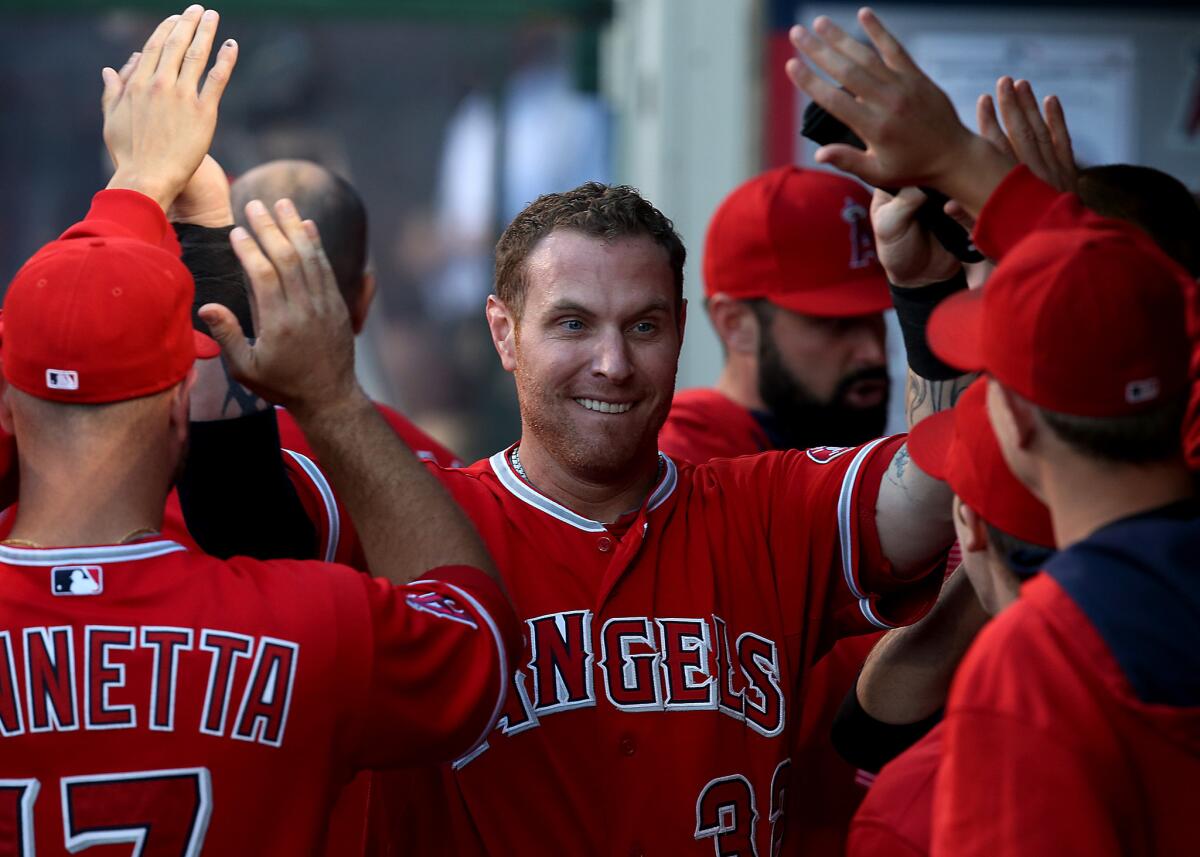Angels mailbag: OK, so, what’s the plan?

- Share via
Hey, how are you? Your favorite baseball team was swept by rival Seattle over the weekend, and now they are off Monday, before continuing their road trip in Chicago and Cleveland. The Angels are 49-62 this season, on pace to lose 90 games, which is not as bad as it looked like they might be earlier this year, but is definitely not good either.
As always, this is the place to ask anything you want about the Angels, with questions submitted through my email (pedro.moura@latimes.com) and Twitter account (@pedromoura).
The Angels’ most basic problem, the way I see it, is that they issued a few free-agent contracts as if they were a massive-market team, and otherwise do not operate in that manner. I don’t think any team but the Yankees and Dodgers could survive a $53-million annual outlay to two players who, together, are not worth 1 Win Above Replacement. Those players, of course, are Josh Hamilton and Albert Pujols, and the Angels are paying nearly $41 million to Jered Weaver and C.J. Wilson this season, and, again, those players are not worth 1 Win Above Replacement.
The rest of the Angels’ 25-man roster, or what they opened the season with, is not bad. New General Manager Billy Eppler found some legitimate bit pieces to surround the core he assumed. And, with commensurate production from the four who are receiving 57% of the team’s payroll, this team could have been in contention right now.
But because of these free-agent signings, because of their inactivity on the international market, — first voluntarily, then forced by their ill-fated Roberto Baldoquin signing — and probably because of a few other things that are harder to pin down, the Angels do not have reinforcements ready. The upper levels of their farm system are devoid of interesting prospects.
Pedro, you have repeatedly stated throughout the season that Arte Moreno refuses to talk to the L.A. Times. Do you have a theory or an explanation for this? Furthermore, your Yunel Escobar comments in this past mailbag were quite interesting. The guy is such a clubhouse cancer that even his extremely team friendly contract isn't worth the headache of picking him up? How is he liked in Angels clubhouse? Lastly, what are the fines MLB imposes on those who don't talk to the media like Escobar and Moreno?
Thanks,
Kirk Dingley (via email)
Moreno has said he is displeased with the coverage of the team. I would not describe Escobar as a clubhouse cancer. He more or less keeps to himself, but his effort can elicit frustration from others. He is a very good hitter, with no power and average on-base ability, who plays below-average defense and displays a remarkable lack of desire on the basepaths.
Altogether, he is going to be worth about 2 WAR this year, which, going into his age-34 season next year, would, probably get him paid $10 million to $15 million, if effort and comportment were not in consideration. He stands to make $7 million, so, yes, he will be underpaid, but not by a huge amount.
And, I hope none of the other players are reading this, but, players are not fined if they do not speak to the media. It is not written into MLB’s Collective Bargaining Agreement like it is with the NBA and NFL.
See the most-read stories in Sports this hour >>
Pedro,
It is well known that the Angels farm system is the worst in baseball. How has that system changed (for better or worse) with the influx of this year's draft class and players acquired at the trade deadline. I noticed that many of them are now listed in the Angels Top 30 prospects.
Lon Brunk (via email)
It has not changed, Lon. They are still considered the worst. This year’s first-round pick, a great-hitting college catcher named Matt Thaiss who said in college he was too slow to play the field and is now playing first base, might be the potential impact player closest to reaching the majors. As I write this, he has three home runs in 191 plate appearances across two levels.
With the dismal production in left field this year (and last year), why don't the Angels give Nick Buss an opportunity? Is there some kind of knock on him? He is having a very solid year at AAA, and surely the 40-man roster could be juggled to activate him.
Dan Morgan (via email)
Nick Buss is having a nice season at triple-A Salt Lake, but it is nothing exceptional. Not a lot of power, stolen bases, on-base percentage or batting average. And he is below Shane Robinson, Rafael Ortega and Todd Cunningham on the organizational depth chart, all of whom also had nice seasons at triple-A Salt Lake when they were there. And now, he is below Daniel Nava, who is also at Salt Lake after being designated for assignment.
Now that he's been in the job through an off season and through his first trading deadline, do you have a better sense of how Eppler differs from Dipoto in approach or philosophy?
Bob (via email)
Not really, actually. I think it takes longer to discern a decision-maker’s preferences. And, as with Jerry Dipoto, it is difficult to know which decisions were made by which decision-maker. Obviously, Dipoto was the Angels’ general manager from October 2011 to July 2015, but owner Arte Moreno made some of the biggest decisions during that time. Obviously, Eppler has been the Angels’ general manager since October 2015, but he has had to work within the constraints of Moreno’s wishes.
We can really start to judge Eppler on who he hires to replace Ric Wilson as the Angels’ amateur scouting director, and how the Angels perform in the first international signing period they can truly participate in, July 2, which will be key for the future of the franchise.
Otherwise, it’s notable that Eppler's approach to last off-season was largely to acquire players who do not strike out, and turn the Angels into more of a contact-making squad than Dipoto assembled. It’s too early to say if that will be an ongoing trend.
I find this sort of question interesting. At what point does a former general manager cede the majority of responsibility to the current one? It is challenging to come up with a rational answer. Look at Boston, for example, to steal something discussed on Baseball Prospectus’ superb Effectively Wild podcast this year.
How much credit should Theo Epstein get for the 2016 Red Sox? He signed David Ortiz. He signed Xander Bogaerts. He drafted Mookie Betts. How much credit should Ben Cherington get, and Dave Dombrowski? I think Epstein might be more responsible for this year’s team’s successes or failures than either of the two who followed.
Generally, general managers’ effects on franchises last longer than our inclinations would have it. So, I would say, Dipoto has impacted the 2016 Angels more than the 2016 Mariners, although he did make quite a lot of moves last winter.
This concludes the Dipoto section of this week’s mailbag.
Kaleb Cowart holds little to no value as a trade chip. He has seven home runs in the Pacific Coast League this season. That does not really play at third base in the major leagues, even with above-average defense. He last hit double-digits in homers in 2012. While he has remade himself into a guy who should at least get another chance at the big leagues in some form, he is not going to get a position handed to him.
I was curious to see what the Angels would do at the position if they traded Escobar. Gregorio Petit and Cliff Pennington could’ve handled it the rest of the season. Would the Angels try to do the same next year, give Cowart the chance, or sign someone else?
That could still come into play if Escobar is dealt in the off-season.
Richards is still no lock to be fit to start next year. But, if you want to look at it optimistically and count on him, you would say: Garrett Richards, Tyler Skaggs, Matt Shoemaker, Rick Nolasco and, ideally, Alex Meyer.
Without him, it’d be Skaggs, Shoemaker, Nolasco, Meyer, and maybe Nate Smith, or maybe a retread with some track record of success.
This is the reason it will be so difficult for the Angels to compete next season. In their best-case scenario, their top pitchers are going to be coming off unusually abbreviated major league seasons. Who knows if Richards and Skaggs will be able to handle 200 innings apiece in 2017?
Again, Moreno has declined repeated requests for an interview with The Times, but there has been nothing that would indicate he is interested in selling the team. Owning professional sports franchises is generally a pretty profitable enterprise.
That concludes this week’s Angels mailbag. Send in your questions to the below addresses at any time, and check back each Monday for answers.
Twitter: @pedromoura
MORE SPORTS NEWS
Ledecky doesn't disappoint, continues to make swimming history
Brazilians slowly warming to Olympic fever
Yasiel Puig's first day in triple-A purgatory: three RBIs, and watching the Dodgers on television
Go beyond the scoreboard
Get the latest on L.A.'s teams in the daily Sports Report newsletter.
You may occasionally receive promotional content from the Los Angeles Times.




